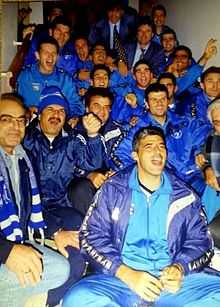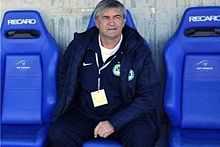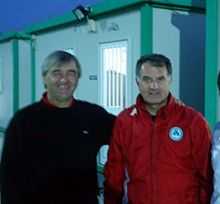Nenad Starovlah
Starovlah in 2014 | |||||||||||||||
| Personal information | |||||||||||||||
|---|---|---|---|---|---|---|---|---|---|---|---|---|---|---|---|
| Full name | Nenad Starovlah | ||||||||||||||
| Date of birth | 29 July 1955 | ||||||||||||||
| Place of birth | Sarajevo, SFR Yugoslavia | ||||||||||||||
| Height | 1.88 m (6 ft 2 in) | ||||||||||||||
| Playing position | Defender | ||||||||||||||
| Senior career* | |||||||||||||||
| Years | Team | Apps† | (Gls)† | ||||||||||||
| 1972–1982 | FC Željezničar | 333 | (8) | ||||||||||||
| National team | |||||||||||||||
| 1978–1980 | Yugoslavia | 12 | (0) | ||||||||||||
| Teams managed | |||||||||||||||
| 1982-1992 | FC Željezničar | ||||||||||||||
| 1985-1987 | SFR Yugoslavia U-21 (Assistant Manager) | ||||||||||||||
| 1987-1990 | SFR Yugoslavia U-16 | ||||||||||||||
| 1987-1990 | Bosnia & Herzegovina U-17 | ||||||||||||||
| 1989-1991 | FR Yugoslav Olympic Team | ||||||||||||||
| 1992-1993 | FK Hajduk | ||||||||||||||
| 1993-1994 | FK Borac | ||||||||||||||
| 1994-1995 | FC Ethnikos | ||||||||||||||
| 1995-1999 | FC Apollon | ||||||||||||||
| 1999-2000 | FC Enosis Neon Paralimni | ||||||||||||||
| 2000-2002 | FC Sutjeska | ||||||||||||||
| 2002-2006 | FC Apollon | ||||||||||||||
| 2006-2007 | FC Željezničar | ||||||||||||||
| 2008-2014 | FC Omonia | ||||||||||||||
Honours
| |||||||||||||||
| * Senior club appearances and goals counted for the domestic league only. † Appearances (Goals). | |||||||||||||||
Nenad Starovlah (Cyrillic: Ненад Сtаровлах; Greek: Νέναντ Στάροβλαχ; born 29 July 1955) is a Bosnian Serb football manager and former Yugoslav international with Cypriot citizenship.
Playing Career

Nenad Starovlah was the total player. He played 333 games for Željezničar as a defender where nevertheless he scored 18 goals. He stayed in Željezničar from 1972–1982, where he won the Yugoslav Championship once. He is one of the most controversial figures in the history of the Željezničar Sarajevo FC team. He was a successful player, loved by Željezničar’s fans. In July 1992, Nenad was chosen as the best young player at the tournament of the Republic Championship.
He also played for the Yugoslav National Team where in the 1978 at the Olympic Yugoslav National Team he won the Gold Medal in Athens and in the 1979 at the Mediterranean Yugoslav National Team he won the Gold Medal in Split. He retired when he was 27 years old, due to his dangerous knee injury.
Managerial career
FC Željezničar
After ending his football career in 1982 he took over U-10 and for eight years he trained with them where they achieved six titles for the Championship of Bosnia and Hercegovina. Due to the fact that sixteen of these players from that generation signed a professional contract with the first team, he took over as coach for Željezničar in 1992. The war in Yugoslavia took place in 1992 and as a result the team split. Many of these players managed to continue their career in successful teams. Some of these players are: Mario Stanić (Benfica, Parma, Chelsea, National Team of Croatia); Elvir Baljić (Fenerbahçe, Real Madrid, Galatasaray, National Team BiH; Marijo Dodik (Mechelen, Slaven Belupo, National Team BiH); Boris Vasković (Vojvodina, FR Yugoslavia); Veldin Karić (Vojvodina, Torino, Lugano, Dinamo, National Team Croatia), and others. He took over Yugoslavia National Team U-16 as an assistant coach of Mirko Jozić in 1990. During the season in charge, he managed to lead the team to the finals of the European Championship in Germany in 1990 where Czechoslovakia defeated them 3-2. Bosnia & Herzegovina U-17 During the same period whilst he was the assistant coach at SFR Yugoslavia, he was the manager of the National Team of Bosnia and Herzegovina U-17. 1988 and 1990 was a very successful season as the team achieved the championship of Republic of Yugoslavia twice and in 1989 where the team won the second place.
FC Hajduk
In 1992, after years of experience in the previous teams managed, Starovlah moved to Hajduk. While he was Hajduk's manager, Hajduk made the greatest achievement in the history of the club until that period of time. The President back then, Radoman Vasović declared: "Even if prior to deciding to assign Nenad Starovlah as our coach, we had information about who and what personality he had, it is not till now that we can say that we are absolutely certain that we received what we wanted: a young and professional manager, a person who is fully dedicated to football, who has energy and ambition to achieve the goal that has been set, and who knows how to teach the players how to play football but also to psychologically motivate them to always give their maximum.”
FC Borac
Starovlah then moved to Borac Čačak, where the committee of the club considered that he was the ideal coach to help their team achieve their major goal which was to enter the first league. In 1994, with Starovlah the team achieved their goal (after a thirty-two year wait), for the first and only time in their history. Due to the continuous success in his career, in 1994 Starovlah was also one of the candidates of Red Star Belgrade. However, Ljupko Petrović took the position.
FC Ethnikos
In 1994, Starovlah signed a 1-year contract with Ethnikos Piraeus, who was in the first league of Greece. During the 1994–95 season, when he was the head coach of Ethnikos, the team played superb football. Greek newspapers were writing back then on Monday 19th September 1994: “Together with its manager Nenad Starovlah, Greek FC “Ethnikos” has played Starovlahs’ dance towards the biggest victory in recent years in first Greek division.”
FC Apollon

From 1995-1999, Starovlah was working in one of the most respectful teams of Cyprus. During these four years he took different positions in the team: academy technical director and manager. In 1998 Starovlah became the manager of the first team of Apollon. He was brought in by club president Dimis Kirzis with the appointment generally welcomed by club's fans due to Starovlah’s glowing reputation as an experienced coach with plenty of success in previous teams. While he was Apollon’s manager, Apollon reached the UEFA Cup League top sixteen for the first time in the club’s history.
FC Enosis Neon Paralimni
In 1999, Starovlah signed a contract with Cyprus's club, FC Enosis Neon Paralimni. During his stay at the club, he reached the team’s expectations where the team also delivered very high quality football.
FC Sutjeska
Continuing his career, in 2000 Starovlah moved to FC Sutjeska. Prior to signing the contract, Starovlah knew he had to cover a range of issues as at that season, Sutjeska was at the bottom of the league table. Even if it was a difficult season, Starovlah improved the quality of the football played and managed to achieve the highest position the team has achieved in its history. Once again the headlines of the newspapers were writing “Старовлах: Успех за памцење,” which in English means “Starovlah: Success to be remembered.”
FC Apollon
After the success in Sutjeska, Starovlah made his second return to Apollon. During his position as the technical director of the academy, he achieved not only the team’s requirements but also made a number of football players who are known to be one of the most successful both in the Cypriot league but also abroad. Some of these players are: Constantinos Makrides, Giorgos Efrem, Giorgos Merkis, Giorgos Kavazis, Athos Solomou, Christos Theofilou, Christos Maragkos, Xenios Kyriacou, Doros Aresti, Loizos Kakoyiannis, Marios Stylianou, Sofronis Avgousti, Stefanos Voskaridis, Andreas Panayiotou, Kyriakos Koursaros, Michalis Christofi. There are many others but these are mostly known. In 2004 and 2006 where he took the position of the manager of the first team, once again he made the team satisfied with his dedication and hard work. On 1st October 2004, the Cypriot newspapers named him “Ο πιο πιστός στρατιώτης,” which in English means “The most dedicated soldier.”
FC Željezničar
In 2006, Starovlah became the manager of FC Željezničar. This was not considered to be one of his successes during his career.

FC Omonoia
Starovlah wasn't out of a job for long, moving to Cyprus and its capital Nicosia, where he signed a contract with Omonoia. He took the position of the technical director of the academy and for the first time the team formed players who play in the first team of Omonoia. Some of these players are: Charis Kyriacou, Panayiotis Frangeskou, Marios Demetriou and Stavros Christoudias. At the moment, he is also responsible for the scouting of the first team of Omonoia.

Reception
Starovlah is widely respected by some players and some coaches. Many of the players never forgot to mention that Nenad Starovlah was their mentor and guided them to their today’s successful paths. Zoran Simunović described Starovlah as “a high quality coach with many diplomas, who managed to make a lot of success in his career.” Moreover, the player Panayiotis Frangeskou named Starovlah to be his “football father,” due to his years of support. Also, Zoran Šaraba stated that “Starovlah is a great expert who is in love with football. He know how to work, he is ambitious, a real professional whom everyone loves: players, management and fans. Whilst Starovlah was working in FC “Hajduk” Kula, the manager of FC “Red Star,” Dragan Džajić stated, “I congratulate the team. They have a nice team, they knew how to play against our players, the won and it brought them one point. Starovlah did a great job.” Ofcourse, Starovlah has also been criticized by certain coaches and players.
External sources
- Profile at Serbian Federation site.
| |||||